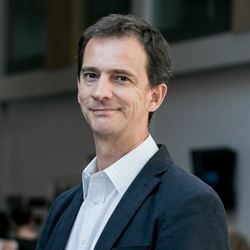
by Professor Richard Bolden
- 16 February 2023
Share:
The surprise resignation of Nicola Sturgeon as First Minister of Scotland, less than a month after Jacinda Ardern stepped down as Prime Minister of New Zealand, provides a sobering insight into the immense scrutiny and pressure that senior leaders now face. Both had seen high levels of popularity and had been widely praised for their handling of the COVID pandemic. They have also experienced a barrage of criticism and declining popularity more recently. Each has shown huge commitment and resilience yet note that there comes a point when it’s time to step aside and make room for someone else to lead.
“It’s time, I’m leaving, because with such a privileged role comes responsibility. The responsibility to know when you are the right person to lead and also when you are not. I know what this job takes. And I know that I no longer have enough in the tank to do it justice. It’s that simple.” (Jacinda Ardern, 18 January 2023)
“Since my very first moments in the job I have believed a part of serving well would be to know almost instinctively when the time is right to make way for someone else. In my head and in my heart, I know that time is now. That it’s right for me, for my party and my country.” (Nicola Sturgeon, 15 February 2023)
Both Sturgeon and Ardern are values-based leaders who demonstrated a firm commitment to ethical and moral principles. Their championing of kindness, compassion, and inclusion has led to some commentators attributing their stepping down to a failure of “woke” politics (e.g., Sky News Australia, 2023 and Morgan, 2023), but this is a gross simplification of the issues and fuels the culture wars that seem to characterize contemporary political discourse. As Sturgeon stated in her resignation speech:
“I have spent almost three decades in front line politics – a decade and a half on the top or second top rung of government. When it comes to navigating choppy waters, resolving seemingly intractable issues, or soldiering on when walking away would be the simpler option, I have plenty experience to draw on.
So, if this was just a question of my ability – or my resilience – to get through the latest period of pressure, I would not be standing here today.
But it’s not.
This decision comes from a deeper and longer-term assessment.
And the nature and form of modern political discourse means there is a much greater intensity – dare I say it, brutality – to life as a politician than in years gone by.
All in all – and for a long time without it being apparent – it takes its toll, on you and on those around you.” (Nicola Sturgeon, 15 February 2023)
Whilst much leadership theory and research focuses on the dysfunctional characteristics of “toxic”, “narcissistic” and/or “psychopathic” leaders, far less attention tends to be given to the toxic environment in which senior leaders often find themselves. Padilla and colleagues (2007) work on the “toxic triangle” goes some way towards addressing this by highlighting the interdependencies between destructive leaders, susceptible followers, and conductive environments, yet it continues to emphasize the psychopathology of individual leaders as a key ingredient in the process. Whilst there are, no doubt, plenty of examples where this is the case, what of the situations where fundamentally “good” people are exposed to unsustainable demands?
As with people who work in environments where they come into contact with hazardous substances, leaders may find themselves dealing with situations that are harmful to their health.
Peter Frost’s (2003) notion of leaders as “toxin handlers” comes perhaps closer to capturing what happens in such situations. As with people who work in environments where they come into contact with hazardous substances, leaders may find themselves dealing with situations that are harmful to their health (for further elaboration see Hartley and Bolden, 2022). In their resignation speeches both Sturgeon and Ardern made a point of saying that they are “human” and that their decision to step down was, in part, made to protect the wellbeing of themselves and their families/loved ones. They also noted that it was in the best interests of their respective countries due to the fact that they no longer felt they had the energy required to sustain such a role.
Such an approach stands in stark contrast to the defiance of Donald Trump, Jose Bolsonaro, and Boris Johnson when they were required to stand aside and the subsequent attempts by their followers to get them reinstated. Whilst “strong” leadership continues to be associated with determination and persistence, Sturgeon and Ardern provide examples of how strength can also be demonstrated by knowing when to pass on the leadership baton to someone else. In so doing, they may also hope to retain a degree of dignity and respect that can so rapidly be eroded by desperate attempts to cling on to power.
In reflecting on the examples of Ardern and Sturgeon, I am reminded of a piece of work that I and colleagues conducted over a decade ago (Brookes et al., 2011), where we explored the experiences of people transitioning from senior leadership roles and the associated identity dynamics of “becoming an ex” (Fuchs Ebaugh, 1988). It struck us that, whilst a lot of attention is given to preparing (or persuading) people to take on leadership roles, far less attention tends to be given to supporting their transition out of such roles. Van Gennep’s (1960) work on rites of passage provided us with a useful framework for considering how any role transition involves going through a process of separation from an established identity, followed by a liminal period (where identities are fluid and uncertain), and, ultimately, arriving at a point of reincorporation where new identities are formed. Such notions underpin Ibarra et al.’s (2010) work on “identity-based leadership development” and the importance of “identity work” (Sinclair, 2011) in the process(es) of becoming (and unbecoming) “a leader.”
Nicola Sturgeon concluded her resignation speech as follows:
“So, to the people of Scotland – to all of the people of Scotland – whether you voted for me or not – please know that being your First Minister has been the privilege of my life. Nothing – absolutely nothing – I do in future will ever come close.” (Nicola Sturgeon, 15 February 2023)
For Ardern and Sturgeon, coming to terms with their new identities as former Prime/First Ministers is a journey they are only just beginning. We should watch and learn how they manage this transition and use it to inform our own work as leaders and leadership developers.
References and Further Reading
Brookes, V., Hooper, A., Bolden, R., Hawkins, B. and Taylor, S. (2011). The Mid-Life Career Transition “… and so what do you do?” Working Paper for the Centre for Leadership Studies, University of Exeter Business School.
Frost, P. (2003). Toxic Emotions at Work: How Compassionate Managers Handle Pain and Conflict. Harvard Business School Press.
Fuchs Ebaugh, H.R. (1988). Becoming an Ex: The Process of Role Exit. University of Chicago Press.
Hartley, L., & Bolden R. (2022). Addicted to Leadership: From Crisis to Recovery. In M. Witzel (Ed.), Post-Pandemic Leadership: Exploring Solutions to a Crisis. Routledge.
Ibarra, H., Snook, S., & Ramo, L.G. (2010). Identity Based Leadership Development. In N. Nohria & R. Khurana (Eds.), Handbook of Leadership Theory and Practice (pp. 657-678). Harvard Business Press.
Morgan, P. (2023, February 15). The Seven Deadly Words Highly Intelligent Nicola Sturgeon Couldn’t Bring Herself to Say Which Caused Her Downfall. The Sun. https://www.thesun.co.uk/news/21395237/piers-morgan-nicola-sturgeon-gender-women-transgender/
Newshub. (2023, January 18). NZ PM Jacinda Ardern Announced Resignation [Video]. YouTube. https://www.youtube.com/watch?v=GGqVT8Vb9UM
Padilla, A., Hogan, R., & Kaiser, R. (2007). The Toxic Triangle: Destructive Leaders, Susceptible Followers, and Conducive Environments. The Leadership Quarterly, 18, 176-194.
Sinclair, A. (2011). Being Leaders: Identities and Identity Work in Leadership. In A. Bryman, D. Collinson, K. Grint, B. Jackson, & M. Uhl-Bien (Eds.), The Sage Handbook of Leadership (pp. 508-517). Sage.
Sky News Australia. (2023, January 19). Ardern’s Resignations ‘Marks a Failure of Woke Politics’ [Video]. YouTube. https://www.youtube.com/watch?v=Jc6mI-wG-0o
Daily Record. (2023, February 15). Nicola Sturgeon Resignation Speech in Full as First Minister Gives Surprise Decision [Video]. YouTube. https://www.youtube.com/watch?v=2y-WCD3sj1Y
Van Gennep, A. (1960). The Rites of Passage (M.B. Vizedom, & G.L. Cafee, Trans.). University of Chicago Press. (Original work published 1908).

Dr. Richard Bolden has been Professor of Leadership and Management and Director of Bristol Leadership and Change Centre at Bristol Business School, University of the West of England (UWE) since 2013. Prior to this he worked at the Centre for Leadership Studies at the University of Exeter Business School for over a decade and has also worked as an independent consultant, research psychologist and in software development in the UK and overseas.
His research explores the interface between individual and collective approaches to leadership and leadership development in a range of sectors, including higher education, healthcare and public services. He has published widely on topics including distributed, shared and systems leadership; leadership paradoxes and complexity; cross-cultural leadership; and leadership and change. He is Associate Editor of the journal Leadership.
Richard has secured funded research and evaluation projects for organisations including the NHS Leadership Academy, Public Health England, Leadership Foundation for Higher Education, Singapore Civil Service College and Bristol Golden Key and regularly engages with external organisations.


